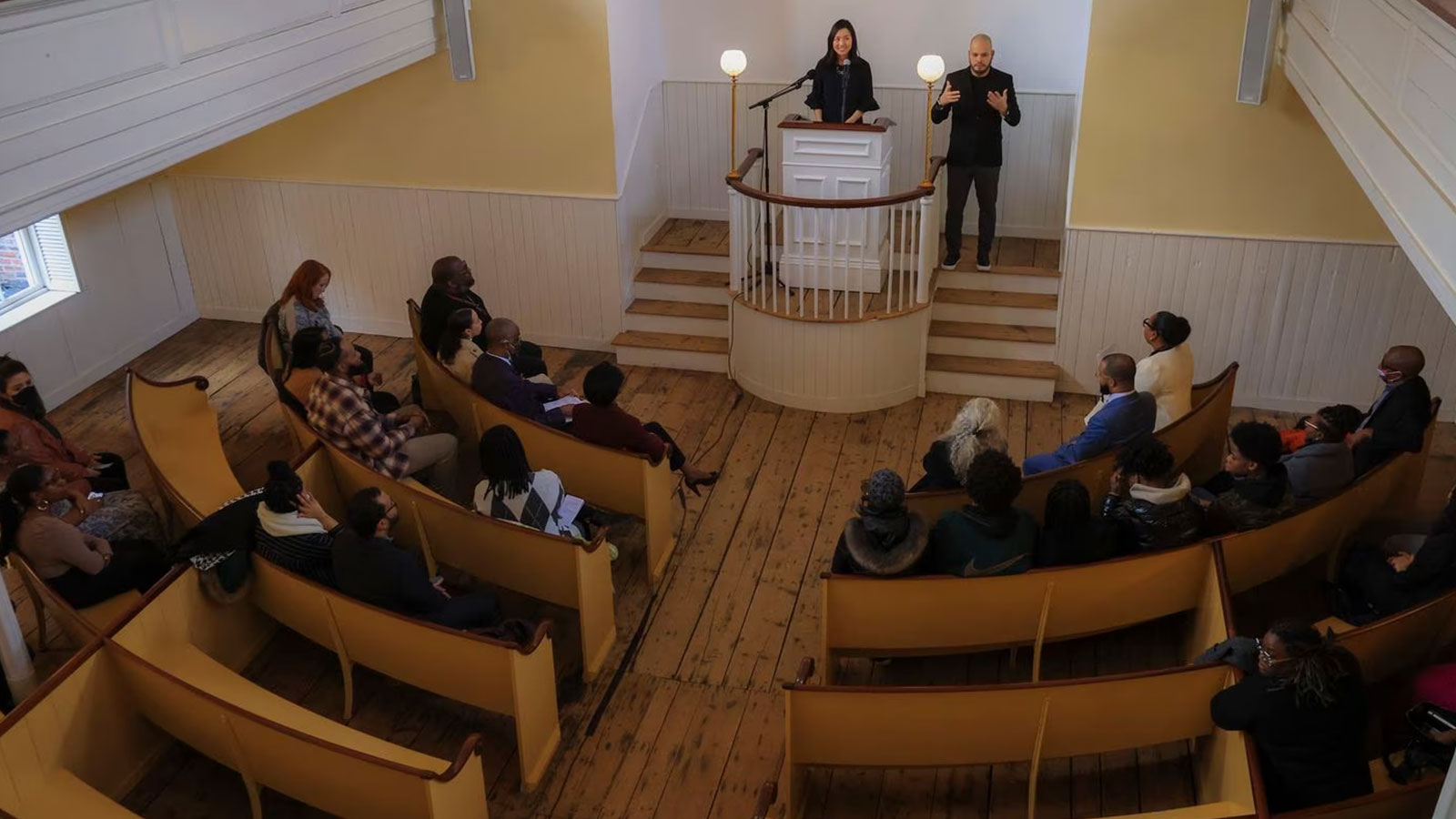Local, state, and federal public policies have undoubtedly robbed Black Americans of opportunities to build wealth.
By Andre M. Perry and Jordan Fields, Boston Globe —
Massachusetts led an embryonic country in establishing and legalizing the institution of slavery. Now its capital city can provide leadership for the rest of the country to follow to atone for that generational injury.
Almost 400 years after Massachusetts first recognized slavery as a legal institution, Boston is looking to repair the harm caused by its participation in the transatlantic slave trade through its Boston Task Force on Reparations, which researches the lasting impact of slavery in the city. Local, state and federal public policies have undoubtedly robbed Black Americans of the opportunities to build wealth, institutions and whole communities. Now, Boston is among a growing number of cities that are acknowledging the role local governments played in slavery, Jim Crow segregation and promoting anti-Black practices like redlining and other discriminatory public policies in criminal justice and education.
Boston has taken a step that many other local and state governments cannot say they have taken, especially when compared to state leaders like Florida Governor Ron DeSantis who are rewriting history to obscure local discriminatory practices.
After two years of research and public hearings, California’s Reparations Task Force issued over 100 final recommendations for a statewide reparations program, and state lawmakers must now decide whether or not to adopt them. In 2019, Evanston, Illinois, passed the nation’s first reparations law, which was narrowly tailored to address segregationist housing policy by providing Black people that have been residents of Evanston since before 1969 with $25,000 grants for home repairs. At the federal level, several efforts have been made by Congress members — most recently, Representative Cori Bush (D-Mo.) took steps to pass legislation that provides financial reparations to Black Americans. But a task force similar to the one created in Boston has yet to be established by the federal government.
However, some scholars — notably, economist William “Sandy” Darity and arts consultant A. Kirsten Mullen — don’t acknowledge local redress efforts as authentic reparations programs. By their definition, those endeavors cannot provide the compensation that is commensurate with the injury caused by slavery since true reparations would close the national White-Black wealth gap. According to the latest Federal Reserve estimates reported in 2019, the median wealth for White families was $188,200 — 7.8 times that of the typical Black household, at $24,100. Because local remedies won’t come close to closing this gulf, Darity and Mullen would rather local efforts be considered “racial equity initiatives” so they won’t distract organizers from the larger goal.
Another significant goal of any reparations program involves acknowledgement and atonement. The National Coalition of Blacks for Reparation in America (N’COBRA) provides a general definition of reparations as being “a process of repairing, healing and restoring a people injured because of their group identity.”

Carrie Mays, a Boston reparations task force member, at a ceremony announcing the reparations task force at the Museum of African American History. Matthew J. Lee/Globe Staff
The Boston Task Force on Reparations isn’t a distraction or detour from getting commensurate compensation for the damage caused by cities and states (particularly among those that acted before the U.S. was a union). Attempts to acknowledge and redress past action is part of a process that different actors must go through to meet their moral and financial obligations to rectify the injuries these entities caused. Bypassing the harm caused at the local level absolves countless institutions of their responsibility for participating in a violent system where its legacy lives on at local levels today. Moreso, many national policies and programs start at the local level and are codified and resourced by the federal government. One can argue that Black descendants of enslaved persons from Massachusetts, which was established before there was a union, can file a separate claim.
Boston’s effort is not tailored to the goal of closing the racial wealth gap. Rather, it seeks to address the city’s historic wrongdoings and current racial disparities in health, wealth, income and homeownership. The city’s effort to research the lasting impacts of slavery is noteworthy because, as Mayor Michelle Wu has stated, there is no statute of limitations on these sorts of claims, and since Boston has de facto memorials of chattel slavery as part of its built environment, like many other U.S. cities. For example, the historic Faneuil Hall where Revolutionary-era meetings and protests took place and the celebrated Arnold Arboretum were both financed through the labor of enslaved Black people. Likewise, the very presence of Harvard University reminds us there is a local debt owed to the Black descendants of the region.
According to a Harvard report, various presidents, faculty and staff enslaved over 70 people, some of whom worked on campus, for a century and a half. Harvard also gained the majority of its income from investments in Caribbean sugar planters and plantation suppliers, and eventually began investing in cotton manufacturing, real estate and railroads, all of which relied on the labor of enslaved people. Further, Harvard received financial gifts from individuals who gained their wealth through the slave trade in the Caribbean and the U.S., which undoubtedly helped establish the university’s status as one of the wealthiest institutions of higher learning in the nation and likely contributed to its current $50.9 billion endowment.
Since its inception, the Boston Reparations Task Force has held four public meetings. However, they have yet to publish a request for proposals (RFP) process for the research phase of their work. Consequently, much of their meeting time has been dedicated to discussing the RFP draft and identifying researchers and scholars that are knowledgeable about Black Boston history and reparations. Unsurprisingly, community members have already raised valid concerns about what reparations might look like for Boston, which reflect similar ones raised at the national level, such as questions about the scope of the task force’s research, eligibility and community engagement, and what constitutes a repair mechanism. At their June meeting, one member of the public said this was the “most consequential and contentious policy discussion since the end of the Civil War and Civil Rights Movement.”
The Boston community is taking the opportunity to discuss local reparations seriously, and the rest of us should too. While the task force is juggling these basic questions about what their research and recommendations are going to look like, it is important to recognize a part of reparations is acknowledging harm. Boston has taken a step that many other local and state governments cannot say they have taken, especially when compared to state leaders like Florida Governor Ron DeSantis who are rewriting history to obscure local discriminatory practices. Acknowledgment at all levels is the collective first step toward a national program. We should encourage more of these efforts.
The Boston reparations effort should not be dismissed or overlooked. The city’s task force could very well create a reparations model that other municipalities can build upon for their particular context. Reparations won’t come from Washington — they will go to Washington, and the initial local efforts will inform that subsequent congressional act.
Source: Boston Globe
Andre M. Perry is a senior fellow at the Brookings Institution.
Jordan Fields is a research intern at the Brookings Institution.
Featured image: Boston Mayor Michelle Wu announced the members of the city’s newly appointed reparations task force at the Museum of African American History, Feb. 7, 2023. Matthew J. Lee/Globe Staff.


